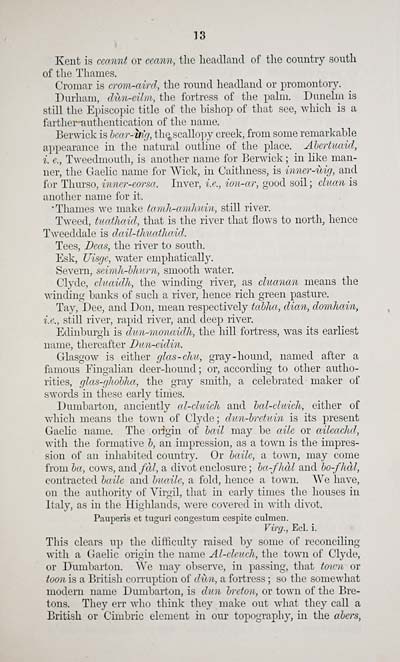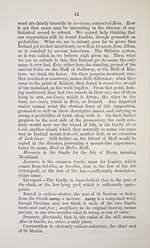Blair Collection > On the antiquity of the Gaelic language shewing its affinity to Hebrew, Greek, and Latin, superseding the Masoretic points, and furnishing a key to the Hebrew vowel sounds
(41)
Download files
Complete book:
Individual page:
Thumbnail gallery: Grid view | List view

13
Kent is ceannt or ccmm, the headland of tlio country south
of the Thames.
Cromar is crom-aird, the round headland or promontory.
Durham, dim-cilin, the fortress of the palm. Dunelm is
still the Episcopic title of the bishop of that see, which is a
farther authentication of the name.
Berwick is hcar-h'g, th(iscallopy creek, from some remarkable
appearance in the natural outline of the place. Ahertuaid,
i. e., Tweedmouth, is another name for Berwick ; in like man-
ner, the CTaelic name for Wick, in Caithness, is inner-uirj, and
for Thurso, inner-emsa. Inver, i.e., ion-ar, good soil ; cluan is
another name for it.
•Thames we make tamli-amliuin, still river.
Tweed, tucdhaid, that is the river that flows to north, hence
Tweeddale is dail-thuathaid.
Tees, Deas, the river to south.
Esk, Uisge, water emphatically.
Severn, seimh-bhurn, smooth water.
Clyde, cluaidh, the winding river, as cluanan means the
winding banks of such a river, hence rich green pasture.
Tay, Dee, and Don, mean respectively tahha, diem, domhain,
i.e., still river, rapid river, and deep river.
Edinburgh is d.un-moncddh, the hill fortress, was its earliest
name, thereafter Dun-eidin.
Glasgow is either glas-chu, gray-homid, named after a
famous Fingalian deer-hound ; or, according to other autho-
rities, glas-gJiobha, the gray smith, a celebrated maker of
swords in these early times.
Dmnbarton, anciently cd-duich and hal-chiich, eitlier of
which means the town of Clyde; dun-bretuin is its present
Gaelic name. The origin of hail may be aile or aileacM,
with the formative h, an impression, as a town is the impres-
sion of an inhabited country. Or laih, a town, may come
from la, cows, and fad, a divot enclosure ; ha-fhal and lo-flial,
contracted hailc and huaile, a fold, hence a town. We have,
on the authority of Virgil, that in early times the houses in
Italy, as in the Highlands, were covered in with divot.
Pauperis et tuguri congestum cespite culmen.
Virg., Eel. i.
This clears up the difficulty raised by some of reconciling
with a Gaelic origin the name Al-cleucli, the towm of Clyde,
or Dumbarton. A\'e may observe, in passing, that town or
toon is a British corruption of dim, a fortress ; so the somewhat
modern name Dumbarton, is dun hreton, or town of the Bre-
tons. They err wlio think they make out what they call a
British or Cimbric element in our topography, in the ahers,
Kent is ceannt or ccmm, the headland of tlio country south
of the Thames.
Cromar is crom-aird, the round headland or promontory.
Durham, dim-cilin, the fortress of the palm. Dunelm is
still the Episcopic title of the bishop of that see, which is a
farther authentication of the name.
Berwick is hcar-h'g, th(iscallopy creek, from some remarkable
appearance in the natural outline of the place. Ahertuaid,
i. e., Tweedmouth, is another name for Berwick ; in like man-
ner, the CTaelic name for Wick, in Caithness, is inner-uirj, and
for Thurso, inner-emsa. Inver, i.e., ion-ar, good soil ; cluan is
another name for it.
•Thames we make tamli-amliuin, still river.
Tweed, tucdhaid, that is the river that flows to north, hence
Tweeddale is dail-thuathaid.
Tees, Deas, the river to south.
Esk, Uisge, water emphatically.
Severn, seimh-bhurn, smooth water.
Clyde, cluaidh, the winding river, as cluanan means the
winding banks of such a river, hence rich green pasture.
Tay, Dee, and Don, mean respectively tahha, diem, domhain,
i.e., still river, rapid river, and deep river.
Edinburgh is d.un-moncddh, the hill fortress, was its earliest
name, thereafter Dun-eidin.
Glasgow is either glas-chu, gray-homid, named after a
famous Fingalian deer-hound ; or, according to other autho-
rities, glas-gJiobha, the gray smith, a celebrated maker of
swords in these early times.
Dmnbarton, anciently cd-duich and hal-chiich, eitlier of
which means the town of Clyde; dun-bretuin is its present
Gaelic name. The origin of hail may be aile or aileacM,
with the formative h, an impression, as a town is the impres-
sion of an inhabited country. Or laih, a town, may come
from la, cows, and fad, a divot enclosure ; ha-fhal and lo-flial,
contracted hailc and huaile, a fold, hence a town. We have,
on the authority of Virgil, that in early times the houses in
Italy, as in the Highlands, were covered in with divot.
Pauperis et tuguri congestum cespite culmen.
Virg., Eel. i.
This clears up the difficulty raised by some of reconciling
with a Gaelic origin the name Al-cleucli, the towm of Clyde,
or Dumbarton. A\'e may observe, in passing, that town or
toon is a British corruption of dim, a fortress ; so the somewhat
modern name Dumbarton, is dun hreton, or town of the Bre-
tons. They err wlio think they make out what they call a
British or Cimbric element in our topography, in the ahers,
Set display mode to: Large image | Transcription
Images and transcriptions on this page, including medium image downloads, may be used under the Creative Commons Attribution 4.0 International Licence unless otherwise stated. ![]()
| Permanent URL | https://digital.nls.uk/80954372 |
|---|
| Description | A selection of books from a collection of more than 500 titles, mostly on religious and literary topics. Also includes some material dealing with other Celtic languages and societies. Collection created towards the end of the 19th century by Lady Evelyn Stewart Murray. |
|---|
| Description | Selected items from five 'Special and Named Printed Collections'. Includes books in Gaelic and other Celtic languages, works about the Gaels, their languages, literature, culture and history. |
|---|

